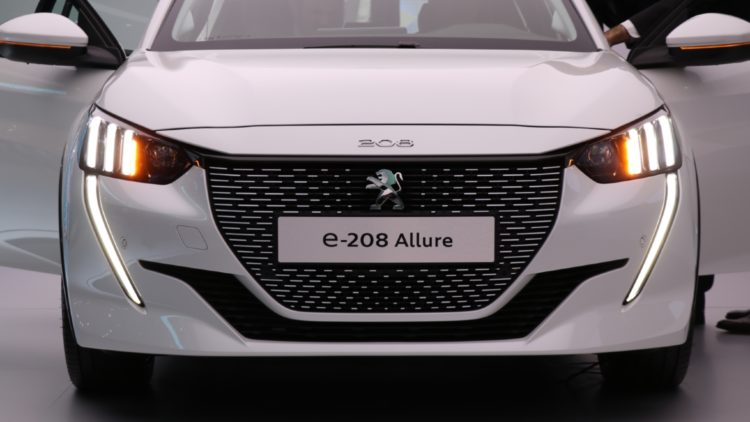DriveElectric predicts that nearly 100,000 electric cars will be sold in the UK in 2020. The forecast is for a 260% increase in battery electric passenger vehicle registrations in Britain.

At least 98,500 new battery electric vehicles (BEVs) will be registered in the UK in 2020, according to DriveElectric. If the forecast is correct, new electric car sales in Britain in 2020 will have to be 260% higher than in 2019. Changes in the British company car tax regime and the increased availability of electric cars are the main contributing factors to the predicted sharp increase in electric car sales in the UK in 2020.
Electric Car Sales Forecast in Britain for 2020
DriveElectric, a leading British electric vehicle leasing company, predicts that at least 98,500 new battery electric vehicles (BEVs) will be registered in the UK in 2020. This figure, based on DriveElectric’s own forecasts, will represent a significant increase from the 37,850 battery electric vehicles registered in the UK in 2019. This will mean a 260% rise for BEV registrations in 2020 compared to 2019. The figure does not include plug-in hybrids (PHEVs).
DriveElectric uses its own model built from its intelligence of the UK market to forecast EV registrations. Reasons for this substantial increase in EV numbers are predominantly a change in the company car tax regime in Britain in 2020, the higher availability of electric cars in the UK in 2020, and a change in consumer attitudes towards both the environment and the electric car driving experience.
New British Company Car Tax Regime Favors EVs in 2020
One of the main contributing factors to DriveElectric’s prediction for a sharp increase in electric car sales in Britain in 2020 is a forthcoming change in the company car tax regime.
Changes to Benefit in Kind (BIK) company car tax: there will be zero company car tax on pure electric cars from April 2020 for a period of 12 months. Switching to an EV from a plug-in hybrid could result in savings for the employee and the company in BIK, fuel and National Insurance in just one year of £4,578.
According to DriveElectric, British employees switching to electric company cars will be substantially better off from April 2020 when Benefit in Kind (BIK) company car tax for EVs drops to 0%. An employee taxed at 40%, driving 20,000 miles a year, would save £1,916 annually by swapping to an electric car such as a Tesla Model 3 Standard Range Plus compared to a BMW 330e M Sport plug-in hybrid. The company would save £662 in employer’s class 1A National Insurance and £2,000 in fuel costs against HMRC Approved Fuel Rates. In total, the savings would be £4,578 in just one year.
DriveElectric also claims to have evidence showing a return to company cars rather than employees taking car allowances. Electric cars will often offer companies clear tax benefits.
Increased Availability of Electric Cars in Britain in 2020
The increased availability of electric cars in 2020 compared to 2019 will also significantly contribute to the predicted sharp increase in electric car sales in the UK in 2020.
The increased availability in electric cars is in part due to the new EU fleet-wide average emissions targets – selling larger numbers of EVs can help car manufacturers avoid substantial fines. Despite Brexit, Britain will remain bound to these rules until at least the end of 2020.
From 2021, the EU fleet-wide average emissions of all newly registered cars from a manufacturer will have to be below 95 g/km CO2. However, this will be phased in from 2020, when the emission targets will apply for each manufacturer’s 95% least emitting new cars. If the average CO2 emissions of a manufacturer’s fleet exceed its target in a given year, the manufacturer has to pay an excess emissions premium for each car registered; the penalty will be €95 for each g/km of target exceedance. This will mean that manufacturers exceeding the emissions targets may have to pay huge fines, which will be reduced if they sell large numbers of EVs.
DriveElectric expects that existing manufacturers such as Tesla will continue with a large market share and a high number of deliveries (approximately 25,000 units).
However, a number of manufacturers are entering the market with new battery electric vehicles, for example, PSA’s electric Peugeot 208 and Vauxhall Corsa, with a predicted volume of 12,000 units.
Volkswagen will have a big push with EVs; although the new ID won’t be ready to roll out of UK showrooms until late 2020. Other all-electric Volkswagen models will help with the firm’s numbers.
Changing Attitude in Britain Towards Electric Cars
According to DriveElectric, there is growing environmental awareness, about climate change and also about challenges with local air quality. EVs help to provide a solution in both areas.
Increasing numbers of initiatives such as Clean Air Zones are resulting in organizations considering renewing their fleets with electric rather than petrol or diesel vehicles. Private buyers are also increasingly hesitant to buy especially diesel vehicles in case future regulations would make these cars undrivable.
However, there is also one additional key factor that is responsible for the increasing shift to electric vehicles, that DriveElectric has witnessed in its trials of EVs with organizations around the UK. Drivers, many of whom may initially have been skeptical about a move to EVs, vastly prefer the driving experience of electric cars and vans to that of their petrol or diesel engine equivalents after experiencing EVs.
About DriveElectric
DriveElectric is an electric vehicle leasing company that has been helping organisations and individuals to adopt EVs to save money, lower emissions and transition to low carbon energy since 2008. DriveElectric aims to make the switch to electric cars and vans simple for business fleets.
